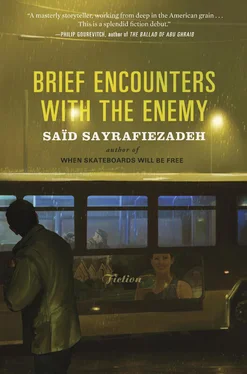And suddenly right then and there, standing in the front row behind the police barricade, not more than a dozen feet from me, waving one of those small ninety-nine-cent American flags that you could buy at any supermarket, was Molly. I saw her before she saw me. Her red hair was loose and long, longer than it had been before I’d left, and it was cascading down her shoulders like a lion’s mane. She was wearing a sweater because it was breezy and cool, but there was an extra button unbuttoned that allowed me to see the tops of her breasts. She had small breasts and a big butt, which I liked. “It’s all going to waste,” she’d written me, two months into my deployment. The truth was, we’d hardly ever had sex. Maybe ten times total. Twice in my car and the rest on my futon. She’d regretted all of them. “I’m sorry, I’m sorry,” she’d sobbed the last time. She’d put her face in her hands and her hair fell forward. I wasn’t sure if she was sorry about the sex or sorry about being sorry. I’d tried to put my arm around her shoulder to comfort her, but she shrugged me off. She told me she preferred me as her muse, not her lover. I had no idea what that meant. “From now on,” she said as if making a declaration, but didn’t bother to finish the thought. She tried it for a while — muse not lover — but physical affection cannot be forestalled forever, and eventually she started holding my hand again, and then kissing me, and three weeks before I deployed, she put her hand down my pants. Thirty minutes later she was sobbing. Now here she was, as promised, standing in the crowd, looking intense, concerned, almost despairing. She must have been waiting at least two hours for my return, studying the faces of the floating one thousand. She no doubt had reached the point when she was certain I had passed her by. “Here I am, Molly!” I wanted to shout, but I didn’t say a word.
Just to her right was Lola, grinning, waving to anyone and everyone, unmoved by her mother’s dilemma. It was all fun and games to her, this parade. Her umbrella was open, even though it wasn’t raining, and she was resting it on her shoulder, twirling it like a little woman. I was stunned at how much taller she’d gotten since I’d seen her last. If it hadn’t been for her own red hair, I wouldn’t have recognized her. She’d been a girl when I left, six years old, interested in girly things, dolls and teddy bears; now she was close to nine and tending toward women’s things. “Here I am, Lola!” I thought about shouting. But no, I didn’t say a word, because standing beside her, which is to say between her and her mother, was her father, tall and thin and gullible. His face was friendly and welcoming and wealthy. He was clean-shaven. He was clueless. He wore a baseball cap that said U.S.A. He had one hand around Molly’s waist, squeezing her proprietarily, and with the other hand he waved generously at the passing soldiers. “Thank you! Thank you!” he called. There had been only a handful of times when I’d seen him in the flesh, and every time had left me both despairing and emboldened. His presence brought him out of the realm of conjecture and into the solid world, where he eventually would be vanquished.
When it came my turn to receive his thanks, I did so, lifting my hand and waving in return. “Thank you! Thank you!” he shouted naïvely. It was then that Molly saw me. Her face registered shock. Her shock turned to relief. The relief turned to love. I smiled at her as I would at any bystander. Then the truck moved past for the last leg home.
The manual said that I’d most likely experience some aftereffects from the war once I got home. But the first thing I had to do was reclaim my efficiency from Fred the subletter. He was clearly disappointed to see me return. There were no accolades forthcoming.
“I wasn’t expecting you” was what he said. He was probably hoping I’d been killed.
He’d taken decent care of the place while I’d been gone, as well he should have. I’d given him a sweet deal. Somehow he’d managed to leave a palm print on the ceiling in the kitchenette, but other than that I could find no wrong. The apartment was smaller than I remembered, and more cramped. I had thought it would feel bigger after eighteen months away. After all, I’d been living on a military base with five hundred other soldiers, sixty-two to a room, twenty-two to a shower. In the middle of the night I’d be awakened by the sound of everyone snoring.
“How was it, Jake?” Fred wanted to know, meaning the war.
I was sure he didn’t care, and I didn’t care to tell him. I offered a cliché: “Fred,” I said, “I’d do it all over again.”
He liked that. “Thank you for your service,” he said.
He gave me the last month’s rent in cash. I wanted to count it in front of him, because I didn’t trust him, but I waited until he left. The sun was starting to set, and it cast shadows in thin gray lines across the apartment. I call it an apartment, but it’s a room, a square room, fifteen by fifteen with a kitchenette off to the side. I sat down at the table that doubles as a desk, and I counted the money. It was all there, in tens and twenties. It made me feel rich. The feeling of wealth helped to mitigate the feeling of claustrophobia. I spread the bills out on the table. It was the same table where I graded my papers and ate my meals and read my newspaper. If I folded the leaf up, it could be a table that sat six for dinner. I couldn’t even fit six people in the apartment. On the wall was a drawing that Molly had made for me, framed and signed, of a man sitting at a table looking at a drawing of a man sitting at a table. “I like to work in meta,” she’d said. It had been done in charcoal and like everything else she did, it was very good. Sitting there staring, I realized that I’d developed a half-shaped, half-conscious idea that when I returned from the war, I’d be returning to a house. Maybe Molly’s house. When you’re fifteen thousand miles away, it’s easy for things to seem possible and attainable. I could have been at her house in twenty minutes. I’d once driven by on a whim, dinnertime, just once, pretending to myself that I had some errand to run in her neighborhood. Her proximity was terrifying and tantalizing. I could have walked right up and rang the doorbell. Instead, I’d parked across the street and sat in the car. I didn’t even turn the radio on. Her house was grand. It should have been grand, her husband was rich. It had a wraparound porch, it had a balcony off the master bedroom, it had a swing set in the yard. For thirty minutes I sat in the car waiting for something to happen, something like Lola coming out and swinging. Every so often I would catch a glimpse of a figure passing in front of the bay window, but the shade was drawn halfway and I was never certain who it was. Later Molly told me, “Don’t ever do that again.”
But I don’t really mind my apartment, it’s the nicest apartment I’ve ever had, and I’ve had many. We went from apartment to apartment, my mother and I, a succession of apartments, small, big, lousy — roaches, no roaches — on average a new apartment every two years, and one year it was two in one year. That was when times were hard. That was when I was a child. Now I’m an adult with a dishwasher and central air.
It turned out that Fred wasn’t the only one unhappy to see me return.
“Where’s Mrs. Tannehill?” the sixth-graders wanted to know.
Mrs. Tannehill was the substitute the school had hired to take my place while I was gone. She was elderly, fifteen years past retirement, still bouncing from school to school, trying to piece together a living. She had arthritis and perfect diction.
“I do so love children,” she’d told me before I left, as if she weren’t doing it to make money.
Читать дальше












